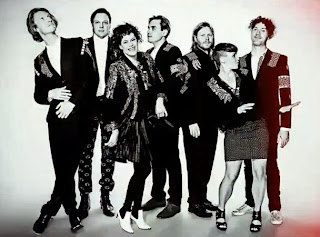Arcade Fire - Reflektor
Two and a half years ago, "who the fuck are Arcade Fire?" was a trending topic on Twitter. A year after, it was Bonnie Bear. The Grammys' viewership and their reactions to certain acts winning certain awards ahead of their teen idols is often amusing, and even moreso given the ubiquity with which Reflektor, their fourth album, has been released. They've now joined the ranks of bands who're virtually guaranteed #1 records upon release, and aside from Coldplay (who've gone sour but started brilliantly) and the Killers (ditto), those bands (Maroon 5, Keane, Kings of Leon) tend to be quite awful. So you'd be forgiven for expecting the band to cater to these new waves of fans with a more watered-down sound but if anything, the band are now drawing criticism for pretentiousness and alienating fans. Reflektor's tracklengths don't look much more accommodating: a ten minute intro and eleven outro, and most of the rest is over 5.
There are some signs of making it to the big time, though: the title track and their first single from the LP features backing vocals from, oh, just David Bowie, and the whole thing is helmed by LCD Soundsystem genius James Murphy. But the defining element of Reflektor is its ad campaign: a series of weird, cryptic graffiti messages, anonymous videos put onto the web and countdowns. It grew a little more than gimmicky and the hype built and built to Daft Punk levels (and lord knows how many people have whined about them this year) - so what about Reflektor can save them?
How about the title track? Seven and a half minutes of jazzy, rock-disco featuring Bowie? Hell to the yes. The track, themed around the lack of interpersonality about social media ("We fell in love when I was nineteen, and now we're staring at a screen") through witty French wordplay ("Entre la nuit", or "entre l'ennui"?) , might have a message that gets a bit lost when there's such temptation to jump around shouting along "OF A REFLECTION, OF A REFLECTION" whilst hook after hook - that piano towards the end, the saxophones, the bass intro - crashes on top of each other. It's glorious. Not quite as ambitious, 'We Exist' has the misfortune to appear in a year where Franz Ferdinand also released an album; it sounds not dissimilar to their Evil Eye track placed over the bassline to Billie Jean. Not a terrible set of ingredients, admittedly, and the tension throughout keeps it alive - the lyrics allude to coming out of the closet ("Daddy, it's fine - I'm used to 'em now/ But tell me why they treat me like this?") and being confronted with homophobia. That fear of judgment and scrutiny spills over into 'Flashbulb Eyes', although here the music is far more alienating. Perhaps too much so - I can't warm to it. It's an odd blend of Caribbean drums, intermittent space sound effects and small bursts of bass and feedback that's both too short to build into anything exciting and too punishing to be punchy and memorable.
It's followed by the immediately loveable 'Here Comes the Night Time' and its sunny dancefloor disposition. One of their many love letters to Haiti, it lashes out at false missionaries ("if you want to be righteous, get in line") trying to help out in the aftermath of 2010's earthquake, in character-breaking bursts of venom between those initial carnival moments. Breaking character happens often on Reflektor: take the by-any-means rocking stomp of 'Normal Person' prefixed by Win's sarcastic Elvis impression, or the silly sampling of Jonathan Ross' introduction of the band on 'You Already Know'. The latter, by the way, just happens to be a charming Smiths impression that rather harmlessly sets up their most self-aware and awkward lyrical offering: 'Joan of Arc'. "First they love you, then they kill you, then they love you again" is its ending refrain to disc one, as though to reference their status as the current rock gods and reveal discomfort with such a title. Should probably stop making such loveable music, then, guys.
The second half of the LP is much less fluid: after a brief resurrection of their 'Here Comes the Night Time' mantra (put to a more meditative and sombre tone - "I hurt myself again", Butler sighs - as vaguely Sufjan strings weave around beautifully), they lounge around with five songs of around six minutes or more. 'Awful Sound (Oh Eurydice)' is by far the most gorgeous - rather lovingly (or snootily, depending on the commenter) described as "every track on Abbey Road in one". The awful sound in question is Eurydice's silence after her death, described in further detail on 'It's Never Over (Hey Orpheus)'. Helped rather a lot by the tragic subject matter, it may be more pertinent to admire the track's rich orchestration - and again on 'Porno', a wonderfully (and suitably) sleazy synth piece that hums and buzzes around with menace as they lament modern life's brazenness. For all of their awkwardness with life, though, they're rejoicing on 'Afterlife' - the album's most reassuring and infectious effort - whilst shooing away the idea that there may be something more. Their closure, 'Supersymmetry', is every bit as opulent and patient as its 11:17 length would suggest, and some are calling it their U2 moment. It's a fair comparison, and is indeed stunning, but maybe a little too much.
For all of Reflektor's magnificence I can't quite understand why they felt it was necessary to split it into two sides other than out of idle posture. Some tracks are also guilty of being worn a little thin and the album is in dire lack of their usual brief, brilliant hits (see: Ready to Start, Rebellion (Lies), Keep the Car Running) that left us exhilarated. Here, the ending impression of this listener is just a touch of awe, but I suppose that's never a bad thing.
Rating: 8.5/10
Highlights: Reflektor; Afterlife; Awful Sound (Oh Eurydice); Here Comes the Night Time; Porno
Avoid: Flashbulb Eyes
Artwork Watch: I think we'd all be embarrassed.
Up next: Paul McCartney




Comments
Post a Comment